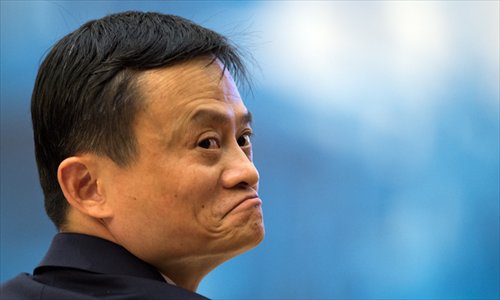China lays out vision for Web governance
World Internet Conference opens

Jack Ma Yun, founder of e-commerce giant Alibaba which recently was listed on the New York Stock Exchange, reacts at the opening ceremony of the World Internet Conference in Wuzhen, East China's Zhejiang Province, on Wednesday. Photo: AFP
President Xi Jinping called on the world to step up Internet governance in a congratulatory message sent to the opening of China's first World Internet Conference, seen by experts as presenting China's vision for future Internet development amid the nation's rising global influence over cyberspace.
"China is ready to work with other countries to deepen international cooperation, respect sovereignty on the Internet, uphold cybersecurity, and jointly build a cyberspace of peace, security, openness and cooperation, as well as an international Internet governance system [based on] multilateralism, democracy and transparency," said Xi in the congratulatory letter sent to the three-day World Internet Conference, which opened Wednesday in Wuzhen, Zhejiang Province, reported the Xinhua News Agency.
Centering on the theme of "An Interconnected World Shared and Governed by All," the conference is covering topics that include global Internet governance, mobile Internet, cross-border e-commerce, cybersecurity and combating terrorism on the Internet.
Internet specialists commented that the conference and Xi's statement show China's commitment to strengthening Internet governance as it becomes an Internet superpower.
"The Internet has evolved from a virtual space to an integral part of Chinese society. [The conference and Xi's message] show that the Chinese government has placed higher priority on managing the Internet, as China is becoming an Internet superpower, with a huge number of Web users and the global influence of Chinese Internet companies like Alibaba," Wei Wuhui, an Internet and new media expert with Shanghai Jiao Tong University, told the Global Times.
Official statistics show that China currently has 632 million Internet users, including 527 million who access the Web from mobile devices. The total number could rise to 850 million by 2015.
The Cyberspace Administration of China, the conference co-organizer, was restructured and became an independent organization in February, after originally being founded in 2011 under the State Council Information Office. The administration became the country's most important governing body overseeing China's Web development shortly after a new panel overseeing Internet security and information technology development led by President Xi was established in February.
Participants at the conference pointed out the importance of governance in light of the Internet's rapid development in China. The three-day conference will serve as an opportunity for China to present its alternative vision for the future of the global Internet.
"Development without discipline and regulation will not be sustainable. As the Internet has developed, problems have emerged. Xi's initiative to construct an international Internet governance system provides direction and practical steps for solving those problems," Huang Chengqing, vice-president of the Internet Society of China and a participant at the conference, told the Global Times.
As the development of the Internet provides individuals with greater freedom to speak and share information, the public should also be responsible for their speech and conscientious about disseminating information that will harm the country's development, said Huang.
As part of the country's Internet governance policy, China released a legal interpretation barring "rumormongering" online in 2013. Four major microblog or Weibo platforms, Sina, Sohu, Tencent and NetEase, implemented a full real-name registration rule for new users in 2012.
Xi also said in his congratulatory message that the development of the Internet has posed new challenges to national sovereignty, security and development interests, all of which require the international community to come together to pursue joint governance and win-win outcomes.
Huang pointed out that the conference has served as a platform for China to set out its alternative vision for Internet development. This vision differs from that of the US government.
"China holds different views on Internet governance as compared to the US. As China is experiencing a major transition in its economy, the nation requires different understanding and measures of governance to ensure stability and avoid social conflicts," said Huang.
Huang said he believes the conference has been conducive to boosting international cooperation on Internet governance through the presence of major Internet companies and non-governmental organizations.
The meeting is gathering Internet titans from both China and around the world. Attendees are scheduled to include Alibaba Chairman Jack Ma Yun, Tencent founder and Chairman Ma Huateng, Chinese search engine Baidu CEO Li Yanhong, Internet Corporation for Assigned Names and Numbers (ICANN) CEO Fadi Chehade and representatives from Qualcomm, Microsoft and Samsung, among more than 1,000 delegates from nearly 100 countries and regions, according to Xinhua.